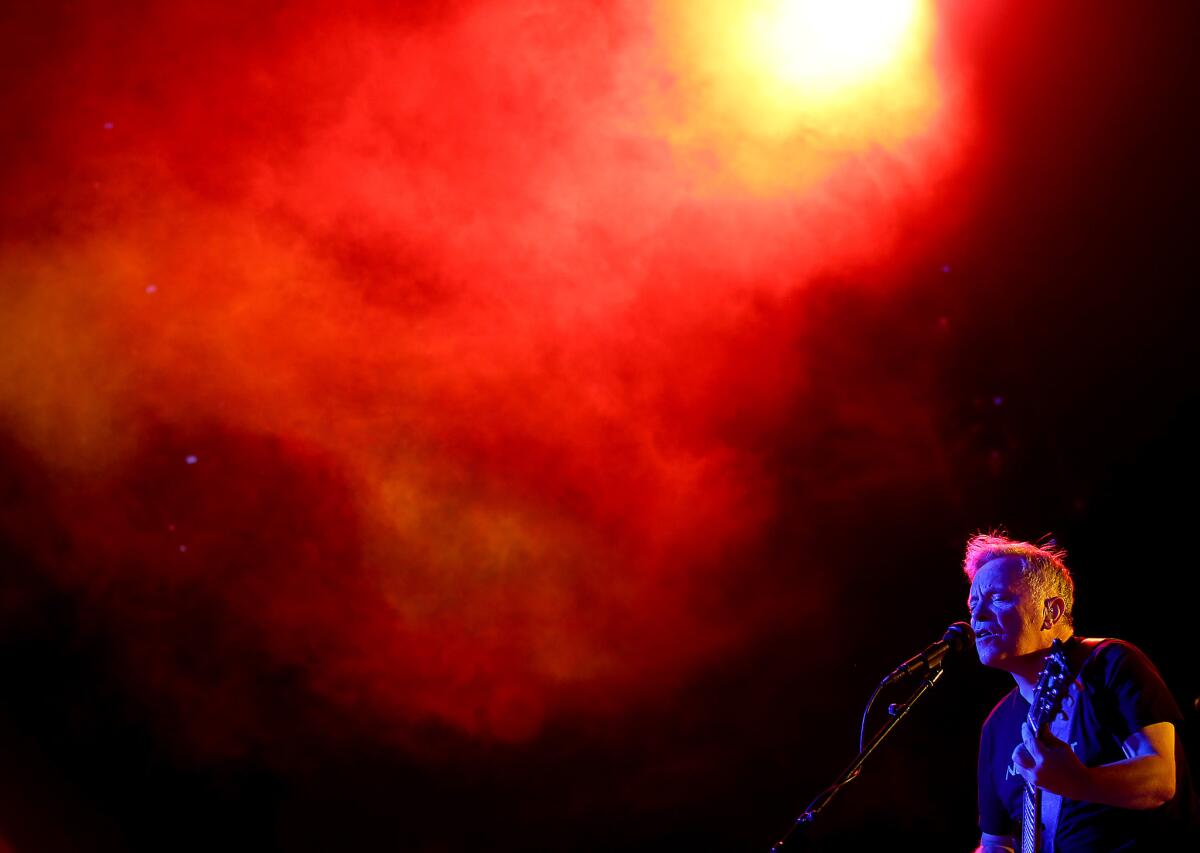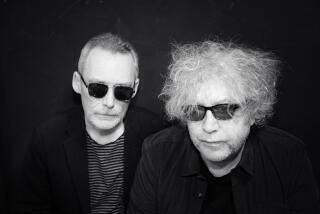Review: New Order closes its U.S. tour at the Greek, celebrates Joy Division

The remark that New Order cofounder Bernard Sumner made between songs at the Greek Theatre on Sunday wasnât meant to sound as flip as it did. But as time passes, the devastation over the loss of a friend evolves. Life goes on, and the wound gradually heals.
Describing the British dance-rock innovatorsâ grimly infectious first single, âCeremony,â Sumner -- also a founding member of the seminal Manchester, England, post-punk band Joy Division, whose lead singer, Ian Curtis, committed suicide -- referred to âCeremonyâ as âa song we wrote right before Ian died. We were trying to cheer him up a bit. Obviously, it didnât work.â
Thatâs an understatement. Had it, we would have been watching another band altogether Sunday, and the joyous, throbbing momentum of New Orderâs best songs, typified by Sumnerâs sweet, optimistic tenor, would likely have turned a particularly Curtis-ian shade of gray.
New Order was on the final set of its American tour, and that gesture was better received by fans than by Curtis. Combining Sumnerâs distorted, chiming guitar chords, keyboardist Gillian Gilbertâs undulating Roland synth lines, human metronome Stephen Morrisâ tight snare-and-high-hat runs and those haunting, high-octave bass lines created by former member Peter Hook, the band presented the synth-pop songs that soundtracked crooked-haircutted singalongs in bedrooms and dance floors throughout the 1980s.
Through hits âTrue Faith,â âBlue Monday,â âA Perfect Kiss,â âRegret,â âTemptationâ and others, the band illustrated not only the durability of its sound but also the breadth of its influence. (Said inspiration was evident in La Rouxâs tightly wound, vibrant opening set -- even if use of backing tracks seemed to extend to the singerâs vocals, as well.)
New Order imagined a post-Kraftwerk, post-disco, post-punk world in which exuberance could dance with confusion to create a swirl of emotional tension. Over that time, the band has not only witnessed but also steered the evolution of dance floor-fueled electronic rock. New Order helped foment the rise of rave culture through its legendary Manchester club the Hacienda, and it channeled the ideas spawned at the club and in the budding New York City beat music scene to deliver massive tracks. Driven to explore new synthesizer technology and its ability to deliver never-ending robotic loops, New Order (and in the beginning, producer Martin Hannett) merged these fresh tones with the frenetic energy of punk rock.
âHow does it feel, to treat me like you do?,â wondered Sumner in the landmark dance track âBlue Mondayâ as Gilbertâs synth marked out synchronized tones and Morris, tucked among a circle of cymbals and drums, traced a tense beat. During one of the bandâs biggest hits, âBizarre Love Triangle,â the entire Greek was locked in song: âEvery time I think of you I feel shot right through with a bolt of blue,â they sang, echoing Sumnerâs classic line.
Still, all these gigs have taken their toll. The set was similar to the bandâs show at the Greek in 2012, and the videos backing the group were nearly identical to those used during the actâs Coachella gig in 2013. The songs have solidified, and despite the musicâs inherent thrills, the members have internalized their creation until the chords and patterns have become second nature.
So has the crowd, which let its collective expectations be known when Sumner introduced a new song, âSingularity.â As an audible, nostalgia-laden grumble echoed in the seats, New Order rightfully ignored it. Still, the fresh work sounded like classic Joy Division -- to a fault. It was as though the group had inputted the stylistic data and calculated a new song, one that hit all the notes but lost the essence.
And, it should be noted, while itâs easy to appreciate New Orderâs work without Hook playing those characteristic bass lines, heâs so essential to the songsâ magnetism that hearing them from another bassist seems somehow wrong -- even if stand-in Tom Chapman nailed every note. The acrimony among Hook and the band, however, is well documented.
âLove Will Tear Us Apart,â perhaps? Certainly, and so will clashing personalities. That said, the back story didnât hobble the set one bit. New Order, after all, has endured its share of drama.
Follow Randall Roberts on Twitter: @liledit
More to Read
The biggest entertainment stories
Get our big stories about Hollywood, film, television, music, arts, culture and more right in your inbox as soon as they publish.
You may occasionally receive promotional content from the Los Angeles Times.











